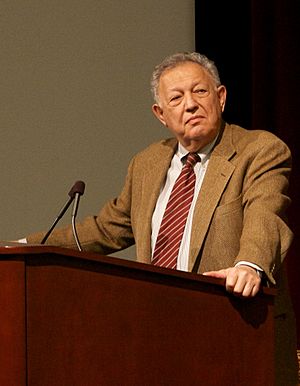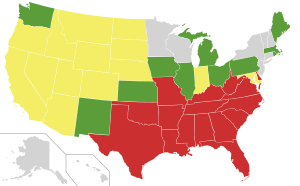Philip Hirschkop facts for kids
Philip Jay Hirschkop (born May 14, 1936) is an American lawyer known for his work in civil rights. He worked with another lawyer, Bernard S. Cohen, to represent Mildred and Richard Loving. The Lovings were arrested in Virginia because they were married, and the state had laws against people of different races marrying each other. Their case went all the way to the United States Supreme Court. On April 10, 1967, Hirschkop and Cohen presented their arguments to the Court. The Supreme Court made a very important decision in the case called Loving v. Virginia. They all agreed that the laws banning interracial marriage were wrong. This decision stopped these laws across the United States.
Hirschkop argued two more cases before the Supreme Court in the 1970s. He has represented many important people and groups. These include Martin Luther King Jr., Norman Mailer, PETA, and many people who protested against the Vietnam War. He has also been a leader in the American Civil Liberties Union (ACLU), helping to start the ACLU of Virginia in 1969. He also worked to improve prisons.
Contents
Early Life and His Path to Law
Philip Hirschkop was born on May 14, 1936, in Brooklyn, New York. He was the youngest of three brothers. When he was young, his family moved to Hightstown, New Jersey, which was a safer place. There, he became friends with African American workers who picked potatoes. He saw them often at his father's clothing store. He says that meeting these workers made him want to fight for fairness and justice.
After high school, at age 18, Hirschkop joined the Army. He became a Green Beret paratrooper in the 77th Special Forces Air Group.
After his time in the Army, he went to Columbia University. He studied Mechanical Engineering. While studying law at Georgetown University in the evenings, he worked in the US Patent and Trademark office. He soon realized that patent law was not exciting enough for him. While still in law school, he met many African-American civil rights lawyers. This greatly influenced him. He later met William Kunstler, a famous civil rights attorney, who became his mentor. Hirschkop once saw a terrible beating of Black people in Danville, Virginia. He said this experience made him decide to become a civil rights lawyer. After that, he went to Mississippi to help people vote. He also helped investigate the "Mississippi Burning" murders of three civil rights workers in 1964.
Loving v. Virginia: A Fight for Equality, 1967
On April 10, 1967, just a few years after finishing law school, Philip Hirschkop argued a very important case. He was a volunteer lawyer for the ACLU. He represented Richard and Mildred Loving in the case called Loving v. Virginia before the Supreme Court of the United States. His co-counsel was Bernard S. Cohen, who also went to Georgetown Law.
Richard Loving was a white construction worker. Mildred Loving was of Black and Native American heritage. They got married in Washington, D.C., in 1958. When they returned to their home in Caroline County, Virginia, they were arrested. They were charged with breaking laws against interracial marriage. This was a serious crime that could lead to one to five years in prison. On the day they got married, 24 states had laws banning interracial marriage. The couple was sentenced to one year in prison. But the sentence was put on hold if they left Virginia for 25 years. Mildred, who was pregnant and had a young child, was held in a small, dirty jail cell for almost a month. After the Civil Rights Act of 1964 was passed, Mildred wrote to Attorney General Robert F. Kennedy. She asked if the new law would allow her and her husband to live in Virginia. Kennedy sent her letter to the ACLU office in Washington.
On June 12, 1967, the Supreme Court made its decision. All the judges agreed. They overturned a ruling by the Virginia State Supreme Court of Appeals. The Supreme Court said that laws banning interracial marriage, known as anti-miscegenation laws, were unconstitutional. They said these laws denied couples equal protection under the law. This protection is guaranteed by the Fourteenth Amendment of the Constitution. Most importantly, the ruling took away the right of states to create or enforce laws that banned interracial marriage.
On February 17, 2017, the Virginia General Assembly praised Philip Hirschkop and Bernard S. Cohen. They honored their work on the Loving case.
What Happened After the Loving v. Virginia Ruling?
The Supreme Court's decision made the interracial marriage laws in 15 states invalid. Most of these states were in the South. Some states, like Alabama, still had these bans written in their laws. However, they could no longer enforce them. Alabama did not officially remove its ban on interracial marriage until 2000. This happened through a special election. Even after the Loving ruling, Alabama continued to try and enforce its bans until 1970.
Other Important Legal Cases
In 1967, Philip Hirschkop argued the case of Koehl v. Resor. In a surprising case, he defended the right of George Lincoln Rockwell, an American Nazi Party activist, to be buried in Arlington National Cemetery. Hirschkop won the case. He first did not want to take the case because of the American Nazi Party's beliefs. But his friends at the ACLU encouraged him to take it. They said it was important to defend free speech, no matter what the speech was. Taking this case caused a lot of upset for his parents and many in the Jewish community.
In 1971, he defended Leslie Bacon, a 19-year-old woman. She was suspected of being involved in a bombing at the United States Capitol.
Defending Vietnam War Protesters
In 1968, he defended Norman Mailer, a famous writer. Mailer was charged with disorderly conduct. This happened when he crossed a police line during a Vietnam War protest at the Pentagon in October 1967. Hirschkop had trouble getting the ruling overturned that required Mailer to serve five days in prison and pay a fine. Hirschkop also defended other well-known people who were arrested during Vietnam War protests.
In May 1971, he was the main legal advisor for over 10,000 Vietnam War protesters. They had been arrested during protests in the capital. He believed many had been arrested unfairly. He was worried about how long it would take for them to be released on bail.
Work for Prison Reform
In November 1971, he helped bring about changes in Virginia prisons. A federal judge said that the conditions in the state's prisons were "cruel and unusual punishment." This included physical punishment, bad diets, checking mail, and not allowing prisoners to see their lawyers. Because of his efforts, one reporter said he helped create "the most sweeping court order ever issued for prison reform."
Fighting for Women's Rights and Education
In 1968, Hirschkop was involved in a Supreme Court case. This case said that an Arkansas law was unconstitutional. The law stopped teachers in state schools from teaching about Darwin's theory of evolution.
In 1970, he successfully argued Kirstein v. University of Virginia. At that time, the University of Virginia did not allow women to attend. Women had to go to other colleges that prepared them to be teachers. Hirschkop gathered a lot of evidence. He called the heads of several Virginia schools to explain why women could not be admitted. By winning this case, he helped Virginia women get a better education.
In 1971, he defended Susan Cohen, a teacher from Virginia. Her case questioned if rules forcing pregnant women to quit their jobs were fair. Hirschkop believed that "most pregnant women can handle teaching chores with no difficulty." The case used the "equal protection clause" of the Fourteenth Amendment. In 1974, he successfully argued the case, Cohen v. Chesterfield County, before the Supreme Court. This ruling ended policies that made pregnant teachers take unpaid leave months before their baby was due. When opposing lawyers used medical reasons to keep pregnant women out of the classroom, Hirschkop brought in medical experts to disagree with them. In another important ruling for teachers, Johnson v. Branch, he helped get one of the first decisions that protected teachers' rights to take part in peaceful protests.
Later Work with Animal Rights
In August 1990, he was part of a case involving his client, PETA. PETA and other animal rights groups were ordered to pay two million dollars. This was for invading privacy and harming the reputation of a showman in Las Vegas. The showman used orangutans in his act. The showman and the hotel had sued PETA after videos of him hitting the animals were shared with the news. Hirschkop argued that the showman, Bobby Berosini, had been secretly filmed hitting the orangutans. He believed that the showman and the hotel should not keep the money they won for harm to their reputation.
Education
- Columbia College, A.B., 1960; Columbia University, B.S.M.E., 1961.
- Georgetown University, J.D., 1964.
Personal Life
Philip Hirschkop married Phyllis in 1959. They had two children. Their marriage ended after 21 years. He has another son from a later relationship.



